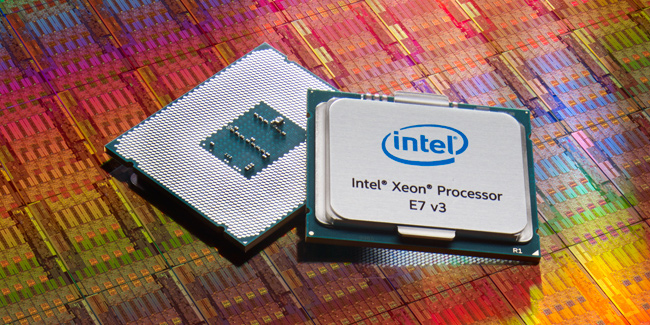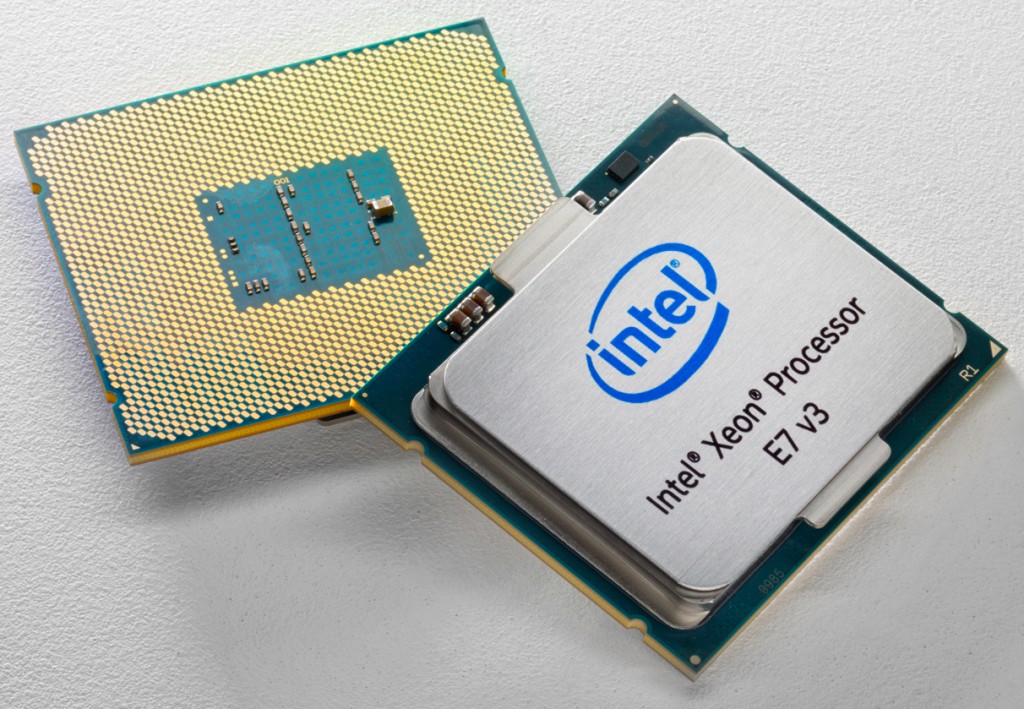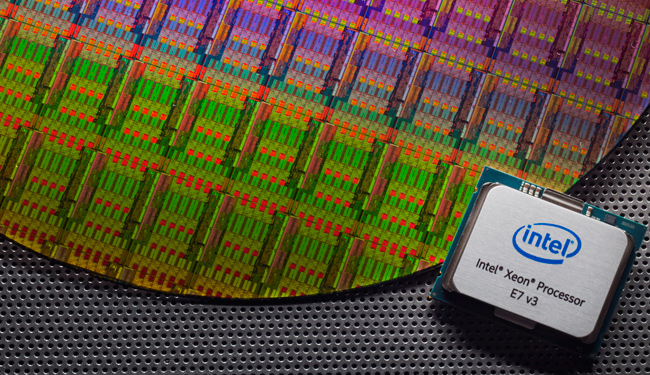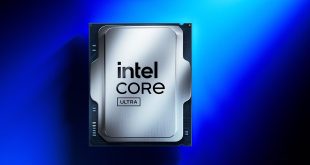Intel Corp. has unveiled its new Xeon E7-8800/4800 v3 microprocessors designed for mission critical, real-time analytics, Big Data and in-memory applications. The new chips integrate up to 18 cores, feature all-new RAS [reliability, availability, serviceability] features and support a number of new technologies that greatly improve performance of specific applications.
The Intel Xeon E7 v3 “Haswell-EX” central processing unit for servers with up to 32 sockets* features up to 18 cores with Hyper-Threading technology; up to 45MB of last-level cache; two new dual-channel DDR3/DDR4 memory controllers compatible with Jordan Creek 2 scalable memory buffer (SMB) that support up to 1536GB of memory per processor; up to 32 PCI Express 3.0 lanes; three 9.6GT/s QPI links to connect to other processors; and up to 165W thermal design power.
The new Xeon E7 v3 microprocessor is based on the Haswell micro-architecture and supports a number of innovative capabilities, including AVX 2.0 instructions; new Intel transactional synchronization extensions (Intel TSX) that improve performance in business processing in-memory applications by up to six times; advanced encryption standard new instructions (Intel AES-NI), as well as additional micro-architectural improvements.
The fresh breed of Intel’s Xeon E7 v3 chips brings additional RAS capabilities for mission-critical servers, further blurring the line between x86 CPUs and microprocessors designed specifically with mission-critical machines in mind. Among the new RAS features of the CPU are second-generation enhanced machine check architecture recovery, which allows the firmware to recover from uncorrectable errors, without interrupting the OS; address range memory mirroring, which mirrors critical portions of memory onto spare memory to protect against uncorrectable memory errors; and some other improvements.
According to Intel, the new processor family achieves a 40 per cent average performance improvement compared to the prior generation. Thanks to enlarged cache and increased amount of cores, the new multi-core CPUs can deliver up to 70 per cent more decision support analytic sessions per hour.
“In the digital services economy, success or failure can depend on how quickly businesses act on insight from vast stores of data,” said Diane Bryant, senior vice president and general manager of the data center group at Intel. “The Intel Xeon processor E7 v3 family is the engine for accelerating business intelligence through real-time analytics, enabling businesses to improve customer satisfaction through more personalized products and services, generate new revenue streams and enhance operational efficiency.”
The new Xeon E7 “Haswell-EX” chip is one the most complex x86 microprocessor ever and is one of the largest in the history of CPUs, it packs 5.56 billion transistors and has die size of 663.5mm2. Intel uses proven 22nm process technology to build its new microprocessor. Since the chip is extremely complex, Intel used lower-leakage transistors in non-timing-critical paths in a bid to lower power consumption of the processor. The chip also uses other methods to keep its power consumption under control.
The new family of Intel Xeon E7 v3 microprocessors includes 12 models with four, eight, ten, twelve, sixteen or eighteen cores. The highest-performing model – E7-8890 v3 – integrates 18 cores, 45MB LLC, operates at 2.50GHz and dissipates up to 165W. The lineup also includes multiple segment-optimized processors such as two high-frequency models that are designed for a subset of database applications requiring the fastest cores available. For example, there is Intel Xeon E7 8893 v3 processor with only four cores that provides leading-edge single-thread performance thanks to 45MB LLC and 3.20GHz clock-rate. The price of processors varies between $1224 abd $7175 in quantities of 1000.
17 system manufacturers from around the world will begin announcing Intel Xeon processor E7 v3 family-based platforms. These manufacturers include Bull, Cisco, Dell, Fujitsu, Hitachi, HP*, Huawei, Inspur, Lenovo, NEC, Oracle, PowerLeader, Quanta, SGI, Sugon, Supermicro and ZTE.
*Intel’s own Xeon E7 server platform supports up to eight sockets. Machines with up to 32 sockets require third-party node controllers and in the recent years they were not popular among server makers.
Discuss on our Facebook page, HERE.
KitGuru Says: The new Xeon E7 v3 processor clearly increases performance dramatically for a wide range of applications, including Big Data, real-time analytics and in-memory business transaction applications. In many cases performance increases lead to revolutions in usage models of technology, which contributes to development of businesses and society in general. However, there is one more thing that the new chip could do. Replace Itanium processors from mission-critical machines running HP-UX and OpenVMS software. Will it do it? Perhaps, if HP finally releases its mission-critical software for x86 central processing units.
 KitGuru KitGuru.net – Tech News | Hardware News | Hardware Reviews | IOS | Mobile | Gaming | Graphics Cards
KitGuru KitGuru.net – Tech News | Hardware News | Hardware Reviews | IOS | Mobile | Gaming | Graphics Cards






Definitely needed for processing 4K cinematic images. A dual 18-core machine with these processors should not drop any frames when playing 4K video.